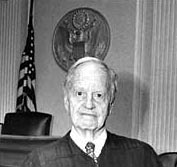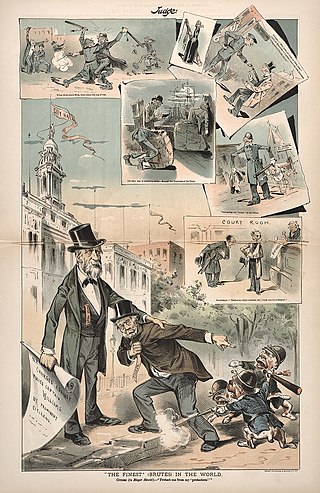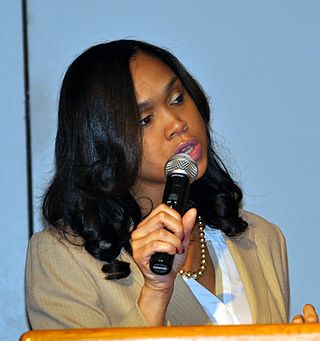Related Research Articles
Perjury is the intentional act of swearing a false oath or falsifying an affirmation to tell the truth, whether spoken or in writing, concerning matters material to an official proceeding.

Mark Fuhrman is a former detective of the Los Angeles Police Department (LAPD). He is primarily known for his part in the investigation of the 1994 murders of Nicole Brown Simpson and Ron Goldman in the O. J. Simpson murder case.
The blue wall of silence, also blue code and blue shield, are terms used to denote the informal code of silence among police officers in the United States not to report on a colleague's errors, misconducts, or crimes, especially as related to police brutality in the United States. If questioned about an incident of alleged misconduct involving another officer, while following the code, the officer being questioned would perjure themselves by feigning ignorance of another officer's wrongdoing.

William Joseph Bratton CBE is an American businessman and former law enforcement officer who served two terms as the New York City Police Commissioner. He previously served as the Commissioner of the Boston Police Department (BPD) (1993–1994) and Chief of the Los Angeles Police Department (LAPD) (2002–2009). He is the only person to have led the police departments of the United States' two largest cities – New York and Los Angeles.

Alan Morton Dershowitz is an American lawyer and law professor known for his work in U.S. constitutional law and American criminal law. From 1964 to 2013, he taught at Harvard Law School, where he was appointed as the Felix Frankfurter Professor of Law in 1993. Dershowitz is a regular media contributor, political commentator, and legal analyst.
Police misconduct is inappropriate conduct and illegal actions taken by police officers in connection with their official duties. Types of misconduct include among others: sexual offences, coerced false confession, intimidation, false arrest, false imprisonment, falsification of evidence, spoliation of evidence, police perjury, witness tampering, police brutality, police corruption, racial profiling, unwarranted surveillance, unwarranted searches, and unwarranted seizure of property.

As of 2020, more than 800,000 sworn law enforcement officers have been serving in the United States. About 137,000 of those officers work for federal law enforcement agencies.

The Commission to Investigate Alleged Police Corruption was a five-member panel initially formed in April 1970 by Mayor John V. Lindsay to investigate corruption within the New York City Police Department. The creation of the commission was largely a result of the publicity generated by the public revelations of police corruption made by Patrolman Frank Serpico and Sergeant David Durk. The commission concluded that the NYPD had systematic corruption problems, and made a number of recommendations.

Kathryn Johnston was an elderly woman from Atlanta, Georgia who was killed by undercover police officers in her home on Neal Street in northwest Atlanta on November 21, 2006, where she had lived for 17 years. Three officers had entered her home in what was later described as a 'botched' drug raid. Officers cut off burglar bars and broke down her door using a no-knock warrant. Police said Johnston fired at them and they fired in response; she fired one shot out the door over the officers' heads and they fired 39 shots, five or six of which hit her. None of the officers were injured by her gunfire, but Johnston was killed by the officers. Police injuries were later attributed to friendly fire from each other's weapons.
The 39th District Corruption Scandal refers to a persistent pattern of brutality and corruption among a cadre of Philadelphia Police Department officers, primarily from the Department's 39th District. The scandal emerged in late 1995 and received nationwide attention by 1997, eventually resulting in an investigation by Human Rights Watch. Hundreds of people were involved in the incidents that occurred in North Philadelphia in the early 1990s. Some individuals are notable due to their direct participation, and others for their participation in related events, particularly the legal proceedings of the conviction of Mumia Abu-Jamal for the murder of Officer Daniel Faulkner.

The Metropolitan Police Department – City of St. Louis is the primary law enforcement agency for the U.S. city of St. Louis.

Jon Graham Burge was an American police detective and commander in the Chicago Police Department. He was found guilty of having "directly participated in or implicitly approved the torture" of at least 118 people in police custody in order to force false confessions.
The Peggy Hettrick murder case concerns the unsolved 1987 death of Peggy Hettrick in Fort Collins, Colorado. Timothy Lee "Tim" Masters enlisted in the United States Navy following a high school career plagued by police accusation of murder when he was a sophomore at Fort Collins High School. After eight years in the Navy, he was honorably discharged. Masters worked for Learjet as an aviation mechanic until 1997, when he was arrested for the murder of Peggy Hettrick. He was charged and convicted of the Hettrick murder in 1999 and sentenced to life imprisonment without parole. His sentence was vacated in January 2008 when DNA evidence from the original crime scene indicated that he was not the responsible party. Three years after his release from prison, Masters was exonerated by the Colorado Attorney General on June 28, 2011. As of 2023, no one else has been charged with Hettrick's murder.

Throughout the history of the New York City Police Department, numerous instances of corruption, misconduct, and other allegations of such, have occurred. Over 12,000 cases have resulted in lawsuit settlements totaling over $400 million during a five-year period ending in 2014. In 2019, misconduct lawsuits cost the taxpayer $68,688,423, a 76 percent increase over the previous year, including about $10 million paid out to two exonerated individuals who had been falsely convicted and imprisoned.

On the morning of September 4, 2005, six days after Hurricane Katrina struck New Orleans, members of the New Orleans Police Department (NOPD), ostensibly responding to a call from an officer under fire, shot and killed two civilians at the Danziger Bridge: 17-year-old James Brissette and 40-year-old Ronald Madison. Four other civilians were wounded. All the victims were African-American. None were armed or had committed any crime. Madison, a mentally disabled man, was shot in the back. The shootings caused public anger and further eroded the community's trust in the NOPD and the federal response to Hurricane Katrina overall.
Henry Glover was an African American resident of New Orleans, Louisiana, who was shot to death on September 2, 2005. Glover's charred body was later found in a destroyed Chevrolet Malibu parked on a Mississippi River levee near a police station.
The stop-question-and-frisk program, or stop-and-frisk, in New York City, is a New York City Police Department (NYPD) practice of temporarily detaining, questioning, and at times searching civilians and suspects on the street for weapons and other contraband. This is what is known in other places in the United States as the Terry stop. The rules for the policy are contained in the state's criminal procedure law section 140.50 and based on the decision of the US Supreme Court in the case of Terry v. Ohio.
Akai Gurley, a 28-year-old black man, was fatally shot on November 20, 2014, in Brooklyn, New York City, United States, by a New York City Police Department officer. Two police officers, patrolling stairwells in the New York City Housing Authority (NYCHA)'s Louis H. Pink Houses in East New York, Brooklyn, entered a pitch-dark, unlit stairwell. Officer Peter Liang, 27, had his firearm drawn. Gurley and his girlfriend entered the seventh-floor stairwell, fourteen steps below them. Liang fired his weapon; the shot ricocheted off a wall and fatally struck Gurley in the chest. A jury convicted Liang of manslaughter, which a court later reduced to criminally negligent homicide.

Marilyn Mosby is an American politician and lawyer who served as the State's Attorney for Baltimore from 2015 to 2023. Mosby gained national attention following the killing of Freddie Gray in 2015, after which she led a highly publicized investigation and unsuccessful murder prosecution of the police officers who arrested and transported Gray.
Len Davis is a former New Orleans police officer. He was convicted of depriving civil rights through murder by conspiring with an assassin to kill a local resident.
References
- 1 2 Slobogin, Christopher (Fall 1996). "Reform The Police: TESTILYING: POLICE PERJURY AND WHAT TO DO ABOUT IT". University of Colorado Law Review . 67. Boulder, Colorado: University of Colorado Law School: 1037. Retrieved December 28, 2012.
- ↑ Hays, Tom (March 21, 1996). "Law and Disorder: NYPD Tackles 'Testilying'". AP News. Retrieved June 10, 2020.
- ↑ Editorial Board (July 2, 2015). "Editorial: Police perjury: It's called 'testilying'". Chicago Tribune . Retrieved March 8, 2019.
- ↑ McFedries, Paul. "testilying". Word Spy. Retrieved December 28, 2012.
- ↑ Rocieniewski, David (January 5, 1997). "Testilying in New York: "Most of the officers at the 30th Precinct during that time were lying about arrests they were making. That's just the way things were done."". New York Times. Retrieved December 26, 2012.
- ↑ Malinowski, Nick (February 3, 2013). "Testilying: Cops are liars who get away with perjury" . Retrieved April 10, 2014.
- 1 2 Keane, Peter (March 15, 2011). "Why cops lie". SFGate. Archived from the original on April 17, 2014. Retrieved March 13, 2015.
- ↑ Alexander, Michelle (February 2, 2013). "Why Police Lie Under Oath". New York Times . Archived from the original on July 29, 2014. Retrieved March 13, 2015.
- ↑ Goldstein, Joseph (March 22, 2018). "Police 'Testilying' Remains a Problem. Here Is How the Criminal Justice System Could Reduce It". The New York Times. ISSN 0362-4331 . Retrieved April 15, 2021.
- ↑ Goldstein, Joseph (March 18, 2018). "'Testilying' by Police: A Stubborn Problem". The New York Times. ISSN 0362-4331 . Retrieved April 15, 2021.
- ↑ Dershowitz, Alan (May 2, 1994). "Accomplices to Perjury". The New York Times . p. A1. Retrieved December 28, 2012.
- ↑ Dershowitz, Alan M. (December 1, 1998). "Testimony on Testilying". United States House of Representatives Judiciary Committee. Retrieved December 28, 2012.
- ↑ "Bratton calls 'testilying' by police a real concern". Boston Globe. November 15, 1995.
- ↑ Stamper, Norm (2016). To Protect and Serve: How to Fix America's Police. PublicAffairs. p. 193. ISBN 978-1-56858-541-3 . Retrieved May 8, 2021.
- ↑ McNamara, Joseph D. (February 11, 1996). "Has the Drug War Created an Officer Liars' Club?". Los Angeles Times . Retrieved December 28, 2012.
- ↑ Stolarik, Robert (November 1, 2011). "Detective Is Found Guilty of Planting Drugs". New York Times . Archived from the original on February 23, 2020. Retrieved March 13, 2015.
- ↑ Yaniv, Oren (February 3, 2012). "Ex-cop Jason Arbeeny cries for judge, gets probation; Judge Gustin Reichbach could have given him 4 years". New York Daily News . New York. Archived from the original on February 4, 2012. Retrieved February 27, 2016.
- ↑ Rosemary M. Collyer, Presiding Judge, United States Foreign Intelligence Surveillance Court (December 17, 2019). "In Re Accuracy Concerns Regarding FBI Matters Submitted to the FISC" (PDF).
{{cite web}}: CS1 maint: multiple names: authors list (link) - ↑ Editorial Board (December 18, 2019). "The FBI must avoid more Carter Page fiascos". The Washington Post.
It was particularly egregious that an FBI lawyer altered an email that would have otherwise painted Mr. Page in a less concerning light.
- ↑ Inspector General Michael Horowitz (December 9, 2019). "Review of Four FISA Applications and Other Aspects of the FBI's Crossfire Hurricane Investigation" (PDF). Department of Justice Office of Inspector General.
- ↑ Jerry Dunleavy (December 9, 2019). "DOJ inspector general finds 17 'significant errors or omissions' in Carter Page FISA applications". Washington Examiner.
These errors and omissions resulted from case agents providing wrong or incomplete information to the National Security Division's Office of Intelligence and failing to flag important issues for discussion.
- ↑ Kamb, Lewis; Nalder, Eric (January 29, 2008). "Cops who lie don't always lose jobs". Seattle Post-Intelligencer . Retrieved January 2, 2013.
- ↑ ""You Lie, You Die" – Dishonesty Derails Discrimination Case". February 29, 2016. Retrieved March 8, 2018.
It's an expression you hear often among police officers and other sworn employees: 'You Lie, You Die.' That is, if you are caught being deceptive about any work-related subject, you will be terminated and your career will be over. This concept was endorsed in a recent appeals court case that can teach lessons to all employers about the importance of honesty in the workplace.
- ↑ Agorist, Matt (February 15, 2019). "'You Lie, You Die': Cops Admit to Lying About Raid that Left Innocent Couple Murdered" . Retrieved March 8, 2019.
- ↑ Balko, Radley (April 16, 2014). "The Watch: How do we fix the police 'testilying' problem?". Washington Post . Retrieved July 13, 2015.